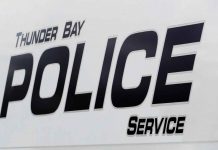THUNDER BAY – Keith Hobbs, who is running for Mayor in Thunder Bay issued a press release last week calling on Mayor Peterson to apologise for her lack of action on crime for the past seven years.
“The concerns raised for over a decade by the Thunder Bay Police Association concerning substance abuse and crime levels fell on deaf ears including Mrs. Peterson”.
Hobbs accuses Peterson “Of sitting quietly on the sidelines while these problems continued to grow. At one minute before midnight and after denying publicly that crime was even an issue, she is asking voters to give her four more years to solve our crime problems. Mrs. Peterson, this community that you ignored for seven years deserves an apology” concluded Hobbs.
In another media outlet in Thunder Bay, as pointed out by a NetNewsledger.com reader, former Chief of Police Leo Toneguzzi wrote, “The Ontario Police Services Act sets out the rules and regulations as well as the policing standards that must be met by all police services in Ontario, including the OPP.”
The former Chief also notes, “No one, not a Member of Parliament, Member of Provincial Parliament, mayor, member of council, nor the police services board members can dictate to the chief of police how to resource the funding or personnel under his command”.
On the Thunder Bay Police Services Board website it states, “The Police Services Act stipulates that the Board shall not direct the Chief of Police with respect to the day-to-day operations of the police service”.
The Police Services Act, states:
- Responsibilities of boards
- 31. (1) A board is responsible for the provision of adequate and effective police services in the municipality and shall,
- (a) appoint the members of the municipal police force;
- (b) generally determine, after consultation with the chief of police, objectives and priorities with respect to police services in the municipality;
- (c) establish policies for the effective management of the police force;
- (d) recruit and appoint the chief of police and any deputy chief of police, and annually determine their remuneration and working conditions, taking their submissions into account;
- (e) direct the chief of police and monitor his or her performance;
- (f) establish policies respecting the disclosure by chiefs of police of personal information about individuals;
- (g) receive regular reports from the chief of police on disclosures and decisions made under section 49 (secondary activities);
- (h) establish guidelines with respect to the indemnification of members of the police force for legal costs under section 50;
- (i) establish guidelines for dealing with complaints under Part V, subject to subsection (1.1);
- (j) review the chief of police’s administration of the complaints system under Part V and receive regular reports from the chief of police on his or her administration of the complaints system. R.S.O. 1990, c. P.15, s. 31 (1); 1995, c. 4, s. 4 (7); 1997, c. 8, s. 21 (1-3); 1997, c. 17, s. 8; 2007, c. 5, s. 9 (1).
In addition, the Act states: “The board may give orders and directions to the chief of police, but not to other members of the police force, and no individual member of the board shall give orders or directions to any member of the police force”.
(Source: http://www.e-laws.gov.on.ca/html/statutes/english/elaws_statutes_90p15_e.htm#BK52)
So the claims made by former Chief Toneguzzi that no one but the Solicitor General may direct the Chief of Police appear to be based on a more selective reading of the regulations.
At issue appears to be the idea that somehow the Police Services Board cannot influence or direct what the police do in their day to day operations. That makes sense. However there is nothing to stop the Police Services Board from pointing out problems and asking the Chief of Police what he will do to solve them.
In other words the Mayor or the Police Services Board may not tell the Chief of Police to dispatch officers to Simpson Street to reduce crime in the area. However the Mayor or the Police Services Board could point out to the Chief of Police that there is a crime problem seen in the downtown southward and ask him what plans he has to solve the problem.
In Thunder Bay, there appears to be a great deal of distance between Police Administration, the Police Services Board, frontline officers and the public.
The commentary from the former Chief appear to be increasing that distance rather than reducing it. The establishment of another community committee to study the problem is not a bad idea, but if, as former Chief Toneguzzi suggests no one can dictate to the Chief of Police a course of action then the efforts of that committee are not going to succeed.
It may well be that in establishing the Crime Prevention Council that Mayor Peterson is well aware that recommendations that council makes to the Mayor can be raised at the Police Services Board, and provide direction to the Chief.
If that is the case, then the question raised by Hobbs on why it has taken so long for action has merit.
What do you think?
James Murray






